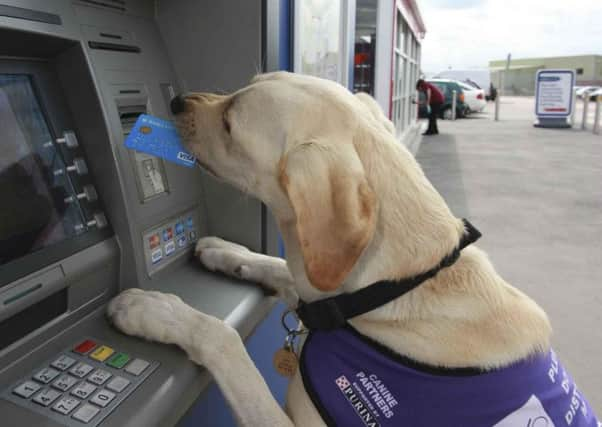Training dogs to use cash machines


Do you see just another kind of working dog, or an appreciative owner who can do so much more with a faithful friend by their side?
What you may not see is just how much has gone on behind the scenes to reach that point, when a dog becomes a lifeline to a person with an impairment.
Advertisement
Hide AdAdvertisement
Hide AdI visited a church hall in Paisley, one of 16 satellite training centres in the UK, for puppies who will one day become canine partners.
Their job will be to assist people with a range of disabilities including multiple sclerosis, arthritis, cerebral palsy, paralysis and incapacity.
This incredible journey starts when they are bouncing, vivacious puppies.
The fluffy pups are temporarily in the care of puppy parents; volunteers who house and help train the dogs by attending regular sessions at training centres.
Advertisement
Hide AdAdvertisement
Hide AdIt requires patience, commitment and love, something that’s on obvious show at the Paisley centre.
The training acknowledges the intelligence of the dogs, praises and rewards obedience and concentrates on valuable skills like walking with owners, waiting, recall and learning to ignore distractions.
There’s an abundance of treats, cuddles and wagging tails.
Verity Bowell, Canine Partners’ Scottish puppy satellite co-ordinator, has overseen the training of 25 puppies.
She said: “I really enjoy seeing the progress of the puppies as they develop and grow in their training, seeing them improve and also seeing their puppy parents develop as trainers.
Advertisement
Hide AdAdvertisement
Hide Ad“It’s also great to problem solve different issues and try different training techniques to find the things that really work for each puppy.
“It’s a fantastic feeling when I hear that a dog that has been trained in one of my satellites is matched with their new partner and is out changing someone’s life.”
After the pups ‘graduate’ from this infant stage, they leave their human parents and go on to advanced training in England that will eventually lead to them being strong dogs that can help to dress their owners, use a cash machine, open doors and drawers, stock the fridge, load the washing machine and get help in an emergency.
And the impact appears to be life-changing.
Ann Eales’s canine partner is so important to her, she refers to him not as an animal but as a “someone”. The mum, who lives in Dumfries, suffers from numbness and loss of feeling down her left side, a condition she developed following childbirth.
Advertisement
Hide AdAdvertisement
Hide AdIt means she’s unsteady on her feet, is prone to falls and is unable to always hold and grip items.
Because of these problems Ann became reluctant to go outside. But things have changed.
Along with husband Nick, Ann lives with four-year-old Labradoodle Alfie, her second canine partner and successor to her beloved golden retriever, Morgan.
“The most important thing is that I know someone will be there for me,” she said.
Advertisement
Hide AdAdvertisement
Hide Ad“Nothing can really go wrong because I always have someone to help me and the confidence that gives you, knowing the dog will help you, is amazing.
“He’s there to be there. With canine partners, the bond you have is much closer than it is with a pet dog.
“They know when something’s wrong, when you’re sick, they pick up on things. And they don’t complain when they have to keep picking things up.”
As well as helping Ann put on her shoes, get dressed and loading the washing machine, her assistance dogs have also stopped her from becoming isolated.
Advertisement
Hide AdAdvertisement
Hide AdAnn added: “You have to go out when you have a dog, you can’t stay at home.
“People talk to you; they see you in a wheelchair and want to know what the dog does. I always stop to talk to people who are interested.
“Having a canine partner is the best thing I’ve done.”
There are 20 partnerships in Scotland – and a long waiting list. Each canine partner costs around £20,000.
Dale Gormley, the charity’s fundraiser for Scotland, said: “The more people who know about us, the more people we can help.
“There is a waiting list as it’s very expensive and takes a long time to train a dog.
“We are in our 25th year, but in many ways the charity is still in its infancy.”